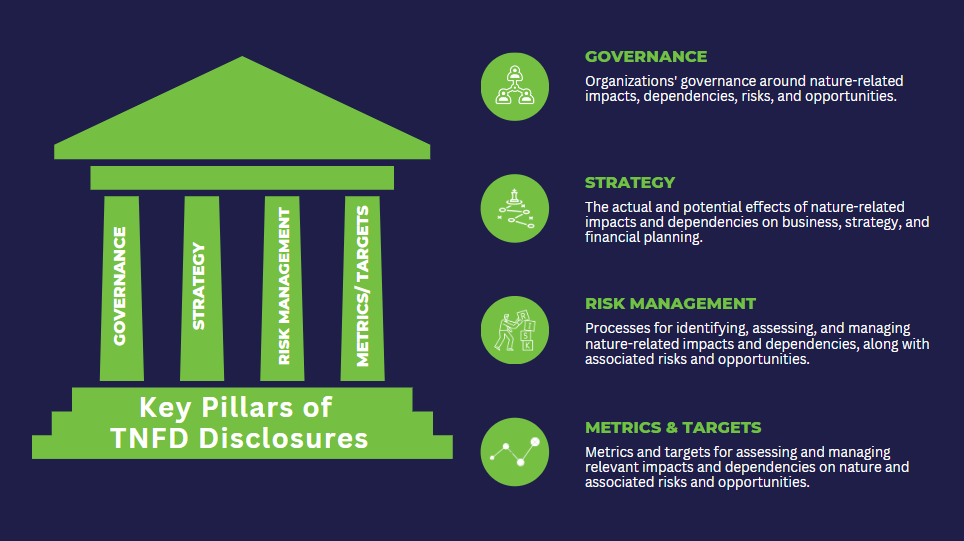Navigating the path to Nature-Related Financial Disclosures
We are running a series of articles on the Taskforce on Nature-Related Financial Disclosures (TNFD). In the second and final article of the series, we look at the implications of the TNFD on financial institutions and what financial institutions should be doing to prepare for TNFD.
At a Glance
- The TNFD’s planned disclosures which cover physical, transition, and systemic factors, will be instrumental in aligning financial institutions with global goals such as achieving no net loss of biodiversity by 2030.
- Under the TNFD framework, organizations will be encouraged to disclose information on four pillars: governance, strategy, risk management, and metrics and targets.
- By adopting the TNFD framework, financial institutions can mitigate risks and seize opportunities to contribute to a more resilient global economy.
We encourage readers to read the first article of the series, where we discussed the TNFD framework and explored the nature-related risks and opportunities that may be relevant to financial institutions’ portfolios.
The launch of TNFD framework has showcased its importance for financial institutions (FIs) to understand its implications and take proactive steps to integrate nature-related considerations into their strategies, operations, and risk management processes.
The TNFD’s planned disclosures will encompass physical, transition, and systemic factors, shedding light on both the risks and opportunities associated with nature. These disclosures will be instrumental in aligning financial institutions with global goals, such as achieving no net loss of biodiversity by 2030 and net gains by 2050, as anticipated in the Post-2020 Global Biodiversity Framework adopted by the UN Convention on Biological Diversity.
TNFD’s approach will enable organizations to build their capabilities, understand their nature-related impacts and dependencies, assess risks and opportunities, and prepare to respond effectively. The TNFD’s impact will vary depending on the nature of the financial institution:
- Banks: Banks need to align with TNFD to support a shift towards nature-positive outcomes. This means considering nature-related risks and opportunities in investments and loans, assessing their impact on ecosystems, and integrating them into risk management.
- Insurers: Insurance companies face challenges in measuring ecosystem impacts, exacerbated by climate tipping points. TNFD can provide comprehensive disclosures for informed underwriting and risk selection.
- Investment Funds and Asset Managers: They must integrate nature-related considerations into investment strategies, assess environmental impact, engage with sustainable practices, and adapt ESG criteria for nature-related metrics.
- Private Equity Firms: Private equity firms will face scrutiny regarding nature impact. They need to evaluate risks and opportunities during due diligence, develop mitigation strategies, and engage with portfolio companies for nature-positive outcomes.
- Pension and Super Funds: TNFD help provide long-term visibility for fund portfolios, influencing investment choices. They may need to divest from high nature-risk companies and allocate capital to nature-positive businesses.
- Credit Rating Agencies: TNFD will help in deeper analysis of nature-related risks in credit assessments. Agencies must include nature-related metrics, influencing ratings, borrowing costs, and access to capital for vulnerable businesses.
- Development Banks and International Financial Institutions: TNFD influences funding criteria, prioritizing nature-positive projects and stricter environmental assessments, especially in sensitive areas.
- Fintech and Technology Companies: These companies must incorporate nature-related considerations into their products and services, respond to sustainability demands, and develop tools for measuring and managing nature-related risks amid growing consumer and investor interest.
Key Pillars of TNFD Disclosures
Under the TNFD framework, organizations will be encouraged to disclose information around four key pillars:
- Governance: Organizations’ governance around nature-related impacts, dependencies, risks, and opportunities.
- Strategy: The actual and potential effects of nature-related impacts and dependencies on business, strategy, and financial planning.
- Risk Management: Processes for identifying, assessing, and managing nature-related impacts and dependencies, along with associated risks and opportunities.
- Metrics and Targets: Metrics and targets for assessing and managing relevant impacts and dependencies on nature and associated risks and opportunities.

Unpacking the ESG framework: Building a viable strategy

Part II. TNFD for Financial Institutions
Ready for a change in your organisation?
Preparing for the TNFD: What Financial Institutions Should Do
Given the urgency of addressing climate-related risks and the growing importance of nature-related issues, financial institutions must take proactive steps now. Here are some actions to consider:
- Embedded System and Data Collection: Plan for collecting more customer data related to nature-based aspects, ensuring embedding the requirements within existing systems making it easier for them to access and provide relevant information and establish robust policies and procedures for Nature based risk management.
- Alignment with Existing Disclosure Frameworks: Confirm alignment with existing ESG disclosure frameworks like TCFD, SASB, and GRI or other frameworks that offer valuable insights into non-financial disclosures and data requirements.
- Nature-Based Impact Assessment: Begin considering the nature-based impacts of your institution’s activities, operations, and investments. Develop strategies for measuring and collecting data on nature-based impacts and risks.
- Board Engagement: Boards must understand how nature-related risk will affect their firm’s business and operations. Recognize the financial and strategic risks and opportunities that nature-related risks present.
In conclusion, as the world faces escalating nature-related challenges, the TNFD emerges as a vital instrument for financial institutions to navigate this complex terrain. By proactively embracing the TNFD framework, these institutions can not only mitigate risks but also seize opportunities that will contribute to a more sustainable and resilient global economy. The time for action is now, and the financial sector’s leadership in embracing nature-related financial disclosures can drive positive change for our planet and our future.
Renoir Consulting for TNFD horizon
As financial institutions are gearing up to navigate the complexities of nature-related financial disclosures, they recognize the need for a partner being vital in facilitating this transformation. At Renoir Consulting, we pride ourselves on our commitment to excellence and our track record of supporting organizations thrive in an ever-changing business landscape. With TNFD poised to reshape the financial industry’s approach to nature-related risks and opportunities, we are well-prepared to guide you through this transformation. Our consultants bring a deep understanding of global sustainability trends, regulatory landscapes, and best practices. We are dedicated to working alongside your organization, tailoring our solutions to your unique challenges and objectives.
We’re here to support you on this transformative journey, leveraging our expertise and experience to help you align with the TNFD framework effectively. Renoir Consulting serves as a strategic partner for financial institutions embarking on the TNFD transformation journey. Here’s how we can help:
- Expert Guidance: Renoir Consulting brings a wealth of expertise in sustainable finance, risk management, and regulatory compliance. Our consultants understand the intricacies of TNFD and can provide insights tailored to your organization’s specific needs.
- Gap Analysis and Readiness Assessment: We’ll conduct a thorough assessment of your current state of readiness for TNFD compliance. This includes evaluating your existing risk management processes, governance structures, and sustainability practices to identify gaps and areas for improvement.
- Strategy Development: Crafting a comprehensive strategy for TNFD compliance is crucial. Our consultants can assist you in developing a clear roadmap that aligns with your organization’s objectives and helps you capitalize on nature-related opportunities.
- Data Management and Reporting: TNFD compliance necessitates robust data collection, management, and reporting capabilities across portfolios. We can help you establish data collection frameworks, implement data quality controls, and design reporting mechanisms that meet TNFD requirements.
- Stakeholder Engagement: Engaging with stakeholders, including investors, regulators, and customers, is key to successful TNFD compliance. We can guide you in developing effective communication strategies and disclosure practices to enhance transparency and build trust.
- Integration with Existing Frameworks: Many financial institutions already adhere to sustainability and ESG (Environmental, Social, and Governance) disclosure frameworks like TCFD, SASB, and GRI. We can help you integrate TNFD requirements seamlessly into your existing sustainability initiatives.
- Training and Capacity Building: Ensuring that your teams have the knowledge and skills to implement TNFD effectively is essential. Renoir Consulting offers tailored training programs and workshops to empower your staff with the necessary expertise.
As you prepare for the TNFD framework’s implementation, consider Renoir Consulting as your trusted partner. Together, we can navigate the complexities of nature-related financial disclosures, unlock new opportunities, and contribute to a more sustainable and resilient future.
Imad Alfadel is the Managing Partner ESG Practice at Renoir Consulting. With over two decades in the financial and consulting sectors, Imad has been supporting companies in enhancing their ESG performance. Through a hands-on approach at Renoir, he supports clients in realizing their ESG ambitions and transforming them into tangible results.
Jagpreet Walia is Partner ESG at Renoir Consulting. As a techno-strategic expert, he has experienced working with clients across emerging and developed markets, leading sustainability, green finance, adaptation, climate risk and decarbonization programs across public and private sectors. His expertise to empower businesses to thrive with collaboration and innovation helps in delivering sustainable impactful results.
Is your organisation struggling to prepare for TNFD implementation?













